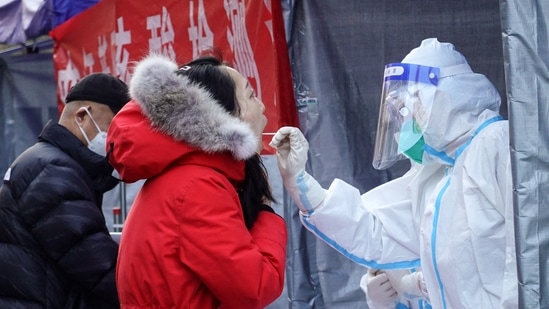China recommits to Covid Zero amid surging Xi’an outbreak
Chinese experts warn that the new surge in Covid-19 infections won't be under control until mid to late January. Officials are committed to taking up a zero-tolerance approach towards the virus.
Chinese officials renewed their commitment to a zero-tolerance approach to Covid-19 even as they battle what is becoming the biggest and most protracted outbreak since the virus emerged in Wuhan two years ago.

Health officials vowed not to waver in their efforts to quash any domestic resurgence and to prevent the virus from crossing borders at a briefing in Beijing on Wednesday. The government limited entry into the capital city on Friday for anyone with a travel history to a border county within the previous two weeks, even if there haven’t been any cases in those places.
Authorities will act “at the fastest speed and with minimal cost,” said He Qinghua, an official with the National Health Commission.
New Covid-19 cases continued to emerge in the western Chinese city of Xi’an, which the government locked down last week. The numbers eased a bit after hitting a record on Tuesday when repeat testing of its 13 million residents identified several previously undetected chains of transmission.
Xi’an reported 151 infections on Wednesday, down from 175 on Tuesday, as residents have been asked to stay indoors and driving is banned. The outbreak spread from a few dozen cases in early December to roughly 150 a day after the city was locked down last Thursday, the most dramatic curb China has enacted to stymie Covid since closing off Wuhan and the broader Hubei province in January 2020.
Five rounds of mass testing have detected more than 900 infections thus far in Xi’an. The outbreak, which was initially traced to a flight from Pakistan, spread quietly throughout the community in its early days. Its ability to evade detection by contract tracers and to permeate every corner of the city is what led worried officials to enact the lockdown.
China’s Plane-Cleaning Rule Spurs U.S. Talks After Aborted Trip
The Xi’an outbreak shows the challenge China faces in eliminating the virus as part of the so-called Covid Zero strategy it has pursued since the start of the pandemic. The approach that features mass testing, aggressive contact tracing, quarantines and sealed borders to prevent infections from seeping in from overseas kept most of the country virus-free throughout the pandemic.
It remains the best strategy for China, despite doubts about its economic and emotional costs, said Liang Wannian, the seasoned epidemiologist that overseas the country’s Covid response. His comments came in an interview with the Paper, a Shanghai-based media outlet.
Lingering Cases
The arrival of the more contagious delta variant has challenged the status quo by proving capable of slipping through those barriers and triggering more frequent domestic flareups since May this year. The prolonged struggle against delta has raised questions about whether such a containment strategy will hold up against omicron, and even more infectious strain.
The emergence of omicron doesn’t mean China will have to change tack, but rather will require more forceful implementation of the current Covid playbook, Liang told the Paper.
While China has detected a handful of imported omicron infections from international travellers, the variant has yet to spread domestically. Officials are ramping up defences at border towns by creating so-called buffer zones. Those areas will have more checks and tighter restrictions to reduce the chance of the virus escaping into the community and causing domestic flareups, according to Liang.
What Covid Therapies Exist, and What Omicron Changes: QuickTake
Experts warn the latest outbreak won’t be under control until mid to late January, just days before the Winter Olympics begin in the capital Beijing.
Earlier this week Xi’an started citywide disinfection, while residents have been asked to stay home and only have one member from each household leave every other day to shop for groceries. Authorities have also suspended all domestic flights and banned private cars on the street.






